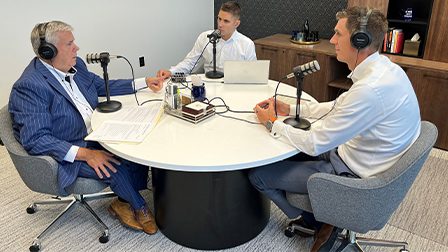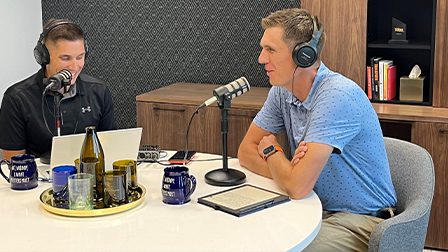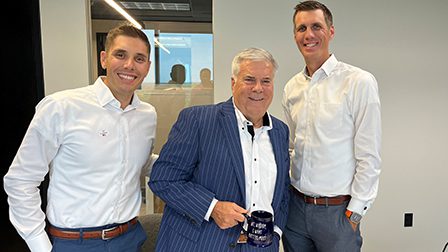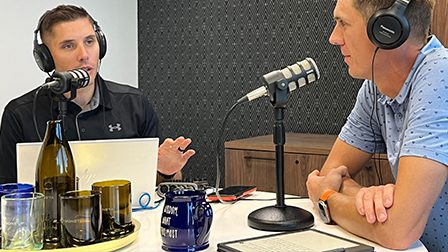Episode Transcript
Episode 12 featuring Peter Biondo
Navigating business from family station wagon to World Champion
Kyle:
And welcome to another edition of Wit, Wisdom, and What Matters Most. It’s a podcast with Moneta’s Gast Freeman Troyer Racen Team. My name is Kyle Luetters. I’m joined by Danton Troyer.
And Danton, a bit of a blast from the past for me on today’s episode; someone that I used to get to work very closely with: a gentleman by the name of Peter Biondo. And Peter is a champion drag racer, family man, and wildly successful event promoter.
And this conversation kind of went all over the place, like we talk about nicknames, we talk about economics, all sorts of stuff. It was fascinating.
Danton:
Yeah, I have no background in racing. So for me, it was just, you know, it’s good to hear that side of things and just learn about a new area that I had no idea about.
Kyle:
So like I said, we’ll cover how he got started in racing, the family background, his racing career, what has meant the most to him. And then the genesis of how one event back in 2010 has now led to arguably one of the most, if not THE most successful brand of bracket races out there. So without further ado, here’s our conversation with Peter Biondo.
And welcome to Wit, Wisdom, and What Matters Most, Peter Biondo. Peter, joining us from New York. How are you doing today, my friend?
Peter:
Doing good, doing good. Definitely can’t complain.
Kyle:
Well, obviously not. It looks like it’s a sunny day there, at least from what we can see, and we were catching up before we got started here – a lot of positives going on in life. But you and I have known each other for quite some time. We’ve worked together for a good chunk of that time. And then we were in a small group together and really did life together for a while. And I’ve always found your story, both in life and racing and business, to be very fascinating. So I wanted to see if you would kind of start at the beginning and talk about how you and your family got involved in drag racing and then kind of the genesis forward as you’ve now become a successful racer, a successful entrepreneur. And anyone nicknamed the Terminator has to be tops in what they do.
Peter:
Well, I appreciate that. So, yeah, guys, my father…I was born into it. My father in the late ‘60s was in a street gang, not really a gang, but street racers. And after the cops got them off the street in the early to mid-‘70s, which I was born in the early ‘70s, my father started going to the racetrack and my mother passed away when I was born, so my father had a three year old, a two year old and a newborn. So we were forced to spend time together and that time was at the racetrack.
Kyle:
And then your dad, there’s a real interesting story, too, I think, about the family station wagon, too. Talk about how dad got started with the racing and how Biondo Racing Products really got going too.
Peter:
Yeah, so that that’s interesting you said that because the station wagon. And so basically, we grew up at the racetrack. Like I said, as a toddler, I had no choice. But as we grew up and got into our early teen years, my father gave us a choice and we played sports and did some other stuff, but we always gravitated to the track – we loved it – to the sport of drag racing.
And so the way the business started, we would race the family station wagon. We would literally tow – the family station wagon would tow the race car on an open trailer. We would get there. Of course, the station wagon was 200 degrees by the time we got there, we’d unhook the trailer, and my brother or I would go race it when we were of age. First, my brother; my father would unload the race car, and that was our weekends.
Now, to beyond the racing products part of it, my father, I didn’t really know what he was doing. He was very, I mean, we spent a lot of time together, but he didn’t tell me that much about business when I was 13 years old. But all of a sudden he writes “Practice trees for sale,” on the side of the station wagon. And I’m racing. And he goes, yeah, if anyone asks you, just tell them we have practice trees for sale $299. And he really was the pioneer of that.
And a practice tree, for those who don’t know, are basically the starting line simulation of a drag race and which is very important to master. So we started selling them. His best friend was making them out of his bedroom and we started going to UPS from my one car garage, which I live in that house now, and as a team, my brother, as we were in our teen years we just stayed as a group, stayed together and worked together. And that’s how the business started.
Kyle:
So your genesis to there’s the family business you started talking about racing with your brother. How did your racing career progress from those days going with the family in the station wagon to really being like a multi-time NHRA (National Hot Rod Association) champion, getting the nickname that we referred earlier, and really being known as one of the IT guys for a long period in NHRA racing?
Peter:
Yes, so you know, I was very passionate about it. And whenever you’re passionate about something, whenever I’m passionate about something, I tend to go all in, and I practiced a lot. I’d say right around the early 1990s, I was dominating locally. And I told my father, I said, “Dad, I want to try. I want to travel nationally and see how I can do.”
And right around the mid-‘90s is when I made my mark in NHRA.
Danton:
It’s kind of impressive. There’s one thing that’s to me is that, I think about my kids and I like to golf and do some things. And they seem to…anything I say that they should do like golf or other activities, they run away from.
But seems like it had the opposite effect for you. So I was just curious how your dad was able to still keep racing, make it fun for you, even though it was maybe something you quote unquote, “had to do.”
Peter:
That’s a great question. And my father was very careful in not forcing us to do it and leaving the road wide open. And he told us that over and over.
I mean, I started playing hockey. I started playing some sports. But as he just kept saying, “You want to come next weekend?” And I would just say, Yes, yes, yes.” So it was totally my option.
You’re right, though, you’ve got to be careful as a parent myself, as we all are with young children, when they’re in their early teenage years you don’t want to hold them captive to one thing and you want to let them grow. And I just gravitated towards it, man.
I’m a competitor. I love the competition aspect of it. I love the fact that it’s not all about speed, although speed is definitely an adrenaline rush. But it’s also about a lot of logic. It’s a lot of figuring out the weather and how it’s going to affect your car, and putting all the pieces together. Whoever can do that the best and then execute on the racetrack. That’s what really drew me to it – it’s very challenging.
Kyle:
Peter, you mentioned something that was pretty interesting there. All the elements that go in there. You meet folks that are not necessarily in the racing industry or they’re not necessarily familiar as much with drag racing. How do you describe it to them all the work that goes into things? Like what if someone comes up to you and says, “Well, you guys are just going down a straight line when the light turns green.” How do you describe all the intricacies that go into it in a short, compact way?
Peter:
The best way to describe it is just like I just did. It’s basically there’s a lot of elements, factors that come into play, and you have to mix them all together. And the big thing is, like anything else in life, you have to know what to listen to and what to put your effort toward and what not to. And what not to is more important because you could easily go down the trick-of-the-week avenue and you’re wasting time and you’re wasting your mental energy.
So, yeah, I mean, I will say this…a good friend of mine who grew up in the neighborhood asked me to teach him how to race about 15 years ago. He was getting back into it; he never really raced on a high level. And I sat with him and I explained everything over a whole eight-hour period.
But then we went to the track and I drove his car at a national event. And after the weekend, he said, “I cannot believe, like I would have never guessed all this goes into that.” So to answer your question, guys, you’d have to kind of be on my arm for a weekend to really know everything that goes into it.
Danton:
Yeah, you already explained more than I would have ever known that goes into the car. I mean, I certainly knew it was more than meets the eye, but just the extra steps that go into it. I think most of us watching who don’t know anything about it think it’s push the pedal and go. But obviously it’s a lot more.
Kyle:
Peter, as you look back on your driving career, there’s obviously got to be a lot of highlights. Is there like a couple, two or three, that really just stand out to you? Big wins or weekends that really stand out that you’re awfully proud of from a driving aspect?
Peter:
Yeah, I would say the two that stand out the most was in the mid ‘90s, I went to the U.S. Nationals for my first time. And that’s the granddaddy – that’s like the Daytona 500 or the PGA Tour. I don’t know, everyone can relate to golf, so Danton, what’s the biggest golf tournament?
Danton:
I mean, you might have the Open, it’s coming up pretty soon, it’s pretty big.
Peter:
Yeah. So, it’s in Indianapolis, so it’s like West Coast and East Coast. All the talk during the year. Who’s the best? Who’s who meets at this granddaddy race.
And I won it in 1993 as a 21-year-old, a 22-year-old. And my father was there, and it was my first national – that win at that race. And him being there and there’s a picture of him on the starting line, like with tears you could see in his eyes. He’s old school Italian; he moved here from Sicily. He was a tough man and didn’t show emotion. But you could see tears in his eyes; that was the biggest one.
Kyle:
Now, kind of the next thing in the genesis, I think, in your story and where I want to go to. So you’re a driver working in the family business as well, too. You and your best friend, Kyle Seipel, competed together for a long time, you on the East Coast, him on the West Coast, so it’s kind of that East versus West type of a deal. But you guys became best friends. And from being around the two of you, very opposite…alike, but very different.
How did the Spring Fling brand bracket races start between the two of you?
Peter:
Yeah, so you hit it right on the head, Kyle. Kyle Seipel and I were, I’m not going to say we were enemies, but we were rivals. We were the same age, I was doing well on the East Coast, he was doing well on the West Coast. And when we saw each other at the events, we would kind of snarl at each other like I’m better than you and blah, blah, blah. But then we became the best of friends.
And in 2010, my girlfriend at the time, Emily, and Kyle and his wife went to Lake Tahoe and we were drawing up, I’m sorry, we were sitting down trying to draw up a schedule that we can…We said we need to – he’s from California, I’m from New York City area – let’s find at least two or three races a year we could race together at and spend time together. And we couldn’t find one.
It seemed like the fun was taken out of the sport at that time. Some of the really fun races were vanished due to neglect. And we said, we just looked at each other and said, “Why don’t we try it?” And that was it.
2010, January 1st, we started drawing on those sheets of paper some ideas, and three months later, we put on our first Spring Fling event.
Kyle:
And talk about what you all went through to plan and then pull off that event, because that was in Bristol, Tennessee. And just describe everything that went into that event, because here you guys are, two racers and now you’re going to kind of what I’d say, go on to the other side of the fence. You’re going to put your promoters’ hats on. Walk us through what that experience was like with that very first one.
Peter:
Well, we had a built-in advantage, let’s say, over our competitors, because for one thing, we were very well, we were very successful as racers, so we had a lot of company support, a lot of manufacturer sponsor support jump right on board with us.
But what we didn’t know is we thought, we’re going to go to these racetracks. I’m going to rent Bristol Motor Speedway, Bristol Dragway, and we’re going to go there and they’re going to run the event and we’re just going to kind of watch. That wasn’t the case.
We learned really quickly that if we wanted it to be our event and our recipe, we were going to have to be hands on every minute of every day. And that that was an eye-opener.
Danton:
One of the things that caught me was you said all the fun events had kind of gone away for whatever reason. I’m curious, from a racer’s perspective, what makes the events fun?
Peter:
What makes the events fun is it’s like any other entertainment business. I mean, first and foremost, they come to race, so you have to remember they want to go up and down the racetrack.
Danton:
Yeah.
Peter:
But aside from that, they’re sitting around, Danton, for more than a few hours at a time and you really want to keep them engaged. And that’s what we found. And Kyle and I, I was more of the – as Kyle Luetters would say – I was more of the head down, figure it out guy. But Kyle was the people person. So we made an incredible, incredible partnership together. And together I would draw things up and he would engage with the people. And so to answer your question in a shorter version, just keep the people from getting bored and keep them entertained, and let them know that you want them there and just keep it fun.
Danton:
Yeah.
Peter:
And it takes a lot of energy to do that as the race is going on. But fortunately, Kyle was able to see some of it -Kyle Luetters, he worked with us for a while and it’s a lot of work. But like anything else, when it’s fun and you love it and you’re passionate about it, it’s not as hard as it looks.
Danton:
Yeah. And so it sounds like you guys were able to expand that series from one to two. And tell me, how did that happen? Were you something you kind of, not necessarily on a whim, but, started a series and then it took off.
Peter:
Yeah, well, we didn’t have any plans on that being our business. I was in the family business selling racing products, which that business was growing and I was heavily involved with. Kyle was selling helmets on the West Coast, which was a successful business in itself.
So we both had a nine-to-five job. We said we’re going to try this once. We had never even talked about doing a second one after the first one. I would have never dreamed we would have did a second one because the first one was that we had a horrible weather forecast, which is the biggest variable that can make or break your event in a racing event. A horrible weather forecast, so we lost a good amount of money after working hard.
And we were taking the banners down and I remember him, Kyle, looking at me to this day I remember where we were standing and he goes, “You think we’re ever going to use these again?”
I said, “No, I think we could throw them out.” But weeks passed and it didn’t rain a bit, it didn’t rain one drop until except for one night out of five nights. And it called for 90 percent, 80 percent every day.
And we didn’t even think about canceling it, we just move forward, but whatever. The bottom line is, we put on an event that was taken well, taken too well by our customers because they called us and “Hey, you gonna do another one? You gonna do another one?”
And a couple of months later, we did a 180 and said, yeah, let’s try again next year.
Kyle:
And so then that success in Bristol, you guys eventually go to the West Coast-ish. You go to Las Vegas and that one has to this day probably the most unique potential pay structure. Talk about the million a little bit, because that’s an event in of itself, especially with where it’s located and then and how the atmosphere of that event is just different, I think.
Peter:
Yeah, well, that was the biggest risk we’ve ever taken as a business, because every racer told us there is no way it will work out there. Vegas is in the middle of no man’s land. It’s great for entertainment with other things, obviously. But if you draw a circle and you try to find 500 racers, that circle is going to be 10 to 20 times larger than, let’s say, North Carolina or Tennessee. So they all said there’s no way it’s going to work out there.
But, you know, it’s definitely a high risk, high reward type business. It can go either way. But we took a , and we took a big shot. We started off a little on the smaller side to hedge our bets, so to speak.
But then after a couple of years, people were coming from all across the country and it became a pinnacle event. And we raised the stakes to call it the Spring Fling Million, where it has the potential to pay a million dollars to one winner. And it’s guaranteed a quarter of a million dollars, but it goes up from there.
Kyle:
I, this is just me having my memories, but like Jeff Verdi, you talk about racers coming from all over. But the very first Spring Fling Million with the big payday, Jeff Verdi towing across the country from Virginia with a cabinetmaker and a Camaro with – I forget the year that it was, but it wasn’t exactly a spring chicken crew cab truck – goes off with against all odds, maybe, I mean, a great racer, don’t get me wrong. But that story I just remember was like you couldn’t script it in Hollywood the way that one went down. And the number of people that were engaged with the event after that was just insane.
Peter:
That definitely put a spark into the event and caught a lot of eyes. Everyone saw the Rocky movie I’m sure, you guys saw Rocky movies as did everyone probably watching this podcast. With that said, it was an absolute, like you said, scripted Rocky movie.
There was the underdog from the East Coast, far Virginia, going towing with an open trailer, which everyone these days has these fancy motorhomes and double trailers. He tows the whole way, it really should have been on Hollywood because he on the way there, he almost got bit by a snake being under the car trying to fix a muffler or something.
And it goes on and on and on. And then he races one of the dragsters from the West Coast, one of the big names from the West Coast, and beats him. And it really was a true underdog story.
You guys got to realize how long it takes to drive and tow a car from Virginia to Vegas.
Danton:
I don’t want to know.
Peter:
From a cabinetmaker, you know, who has a nine to five job and how much money it was.
Kyle:
You guys, again, the success continues to compound. You guys start going to three events, four events…now you guys are up to five events now.
What do you think is the secret sauce here? Like I know, you guys may not say this, your family may not say this, but you guys in a way kind of have a Midas touch here. With the racing, the family business, and now this Fling brand, what do you attribute the success that you all have had in motorsports to?
Peter:
Well, I’d say the passion that we have for the sport itself and the love that we have for the sport itself really was a driving force. Aside from that, Kyle and I, my father would say – my father passed away a few years ago – but he would say that you guys have the best synergy. We were opposite, yet we got along so well and that combination really catapulted us into the front. And to stay there, it was just about finding the right people and working hard and not being afraid to take risks. That’s one thing that we’ve done all across the board, all across the way, all across the years. Not be afraid to take the risk – that’s where our advantage, I think, comes from.
Kyle:
With all of this going on, what do you think, if you dream to the future… what do you think the future holds for you all? Because, I mean, I knew you guys when it was two events and you said, I can’t imagine we do anymore. I just mentioned that you’re going to five this year on the calendar. Like as you dream, Peter, what’s still out there? What’s still something that you want to achieve in doing what you’re doing?
Peter:
Well, I’ll answer that question, but I want to just rewind a quick bit because it just came to mind what we really have a knack for and what’s important in any aspect of any business is the supply and demand. That you’ll hear when you’re in economics when you’re in 10th grade. And that is the biggest thing in any business.
And we were very slow to grow. So we always made sure we had more demand than we did supply. So, it took us three/four years to go to two and another three/four years to go to three.
And I had no intention on going to five, but Bill Bader, one of the most respected track owners in the country, if not the most respected, gave us the opportunity. So I wasn’t going to turn that down.
I don’t know if that answered your question. I went in reverse there a little bit, but that’s the supply and demand. It sounds so, so simple, but just knowing, like when we have it, when we sell pre-entries, we have a cap on how many entries can come in.
And if I go on Google Analytics while it’s happening, I can see if there’s 2,000 people trying to get in a 400-entry event. I know where the supply is. If now it’s getting more diluted so I got to be careful. There’s a lot of promoters just throwing stuff out there, so the numbers aren’t as high.
But to answer your question as for the future, I’m getting older now. I took a step back from racing for a few years to raise my family, I’m into sports with them. And I don’t know, man, I don’t really have any future plans to grow any more than this. I really like our team. I really like the size we are. But I will say there is going to be a day, just like our family business, that I’m going to want to walk away just because I burned myself out with it. But I feel like I have a really good team to pick up my slack when that happens.
Danton:
That’s good. Well, I think one thing that was on my mind that we didn’t talk about was how you got the nickname, the Terminator. We started off with it, but I’m not sure I actually know how you got that nickname.
Peter:
Yeah, so I was a punk kid like in New York with the shaved sides and a rat tail in the back. And I would not talk, I was very shy. I would just walk around the racetrack and I would I was winning every week. So the announcer just said, oh, look, I had like a no-sleeve shirt on and he goes, “There he is, the Terminator.” And that was probably 1988, and it just stuck.
Danton:
It stuck. That’s good; that’s good.
Kyle:
And I think that is a wonderful note to close out on. What a story. Peter, thank you so very much. Number one for doing this, but two for the friendship and the wisdom that you’ve dispensed over the years. It’s been amazing to watch how everything has grown. And it’s been even more amazing now to see your family, Emily, and then now your kids getting involved in the business. So thank you again for doing this. And kudos to you.
Peter:
Yeah, I appreciate it. I had a lot of fun with you guys.
Danton:
Thanks, Peter!
Kyle:
And we just heard from Peter Biondo, racing extraordinaire, event promoter extraordinaire from Bracket Races, the Spring Fling brand of races.
And Danton, didn’t know you so much as a race fan before this. But I think going through Peter’s journey and kind of hearing where he started in New York, to being a racer with a family, and then to really kind of getting into being a successful entrepreneur on the promoter side. It’s kind of a contagious story for a bunch of gearheads, right?
Danton:
Yeah, I mean, I certainly had no background knowledge as far as racing goes, so I probably had some silly questions about racing. But, you know, he did a great job explaining it even to me. But also just outside the track and everything he had to do and kind of go through to get where he is today.
Kyle:
You know, we talk a little bit about it. His business partner and best friend, Kyle Seipel, passed away a handful of years ago. And, you know, one thing we didn’t kind of really delve into was kind of that transition from him and Kyle running the business together to to him now really carrying the mantle. And his lovely wife Emily’s involved; mentioned his kids. Now, if you see on social media, his kids are up there in race control with them working the event. So it’s now really that family, that family business aspect is now carried from Peter and his dad and his brothers, now to Peter, his wife, and his kids as they continue to build out this brand, which is really cool to see.
Danton:
Mm hmm.
Kyle:
You know, a couple of things I learned, you know I had always heard the Terminator nickname, but never knew that that was kind of the start of it, so that was interesting to learn. And then, you know, getting to rehash the Jeff Verdi story, being lucky enough to be there that night was pretty cool. But any other final takeaways from this one? It might be a little step out of the norm from our normal guests, but nonetheless, an interesting story.
Danton:
Yeah, it was just great to hear his story. And we even talked about some economics there in supply and demand, so I think we talked about a wide variety of subjects, and it was really good to hear.
Kyle:
Yeah, we definitely appreciate Peter being on the show and appreciate you all for listening. We get a lot of positive compliments about this show and as long as we have those, we’ll continue to do these as there are many stories out there to tell.
Wit, Wisdom, and What Matters Most is a production of Moneta’s Gast Freeman Troyer Racen Team, headquartered in St. Louis, Missouri.
Until next time, enjoy What Matters Most.




© 2025 Advisory services offered by Moneta Group Investment Advisors, LLC, 100 South Brentwood Blvd., St. Louis, MO 63105 (“MGIA”), an investment adviser registered with the Securities and Exchange Commission (“SEC”). MGIA is a wholly owned subsidiary of Moneta Group, LLC. Registration as an investment adviser does not imply a certain level of skill or training. This is an advertisement. The information contained herein is for informational purposes only, is not intended to be comprehensive or exclusive, and is based on materials deemed reliable, but the accuracy of which has not been verified. Examples contained herein are for illustrative purposes only based on generic assumptions. Given the dynamic nature of the subject matter and the environment in which this communication was written, the information contained herein is subject to change. This is not an offer to sell or buy securities, nor does it represent any specific recommendation. You should consult with an appropriately credentialed professional before making any financial, investment, tax, or legal decision. Past performance is not indicative of future returns. You cannot invest directly in an index. All investments are subject to a risk of loss. Diversification and strategic asset allocation do not assure profit or protect against loss in declining markets. These materials do not take into consideration your personal circumstances, financial or otherwise. Trademarks and copyrights of materials linked herein are the property of their respective owners.



